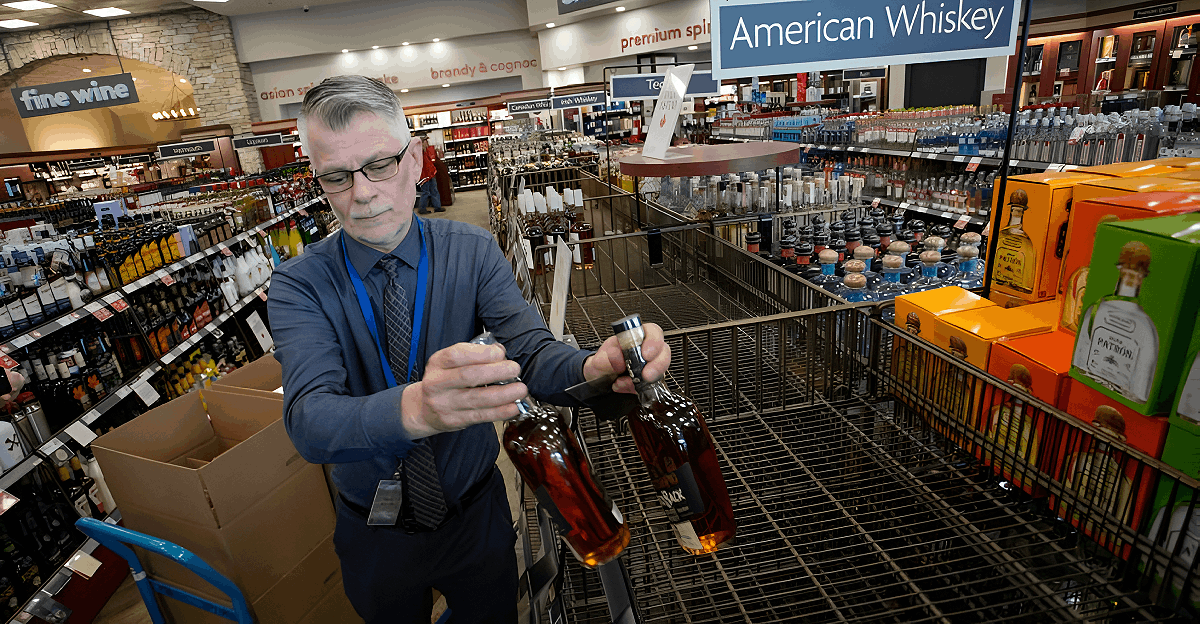
For decades, Canadians have poured Jack Daniel’s at weddings, ordered it in bars, and stocked it at home as a familiar comfort. This year, that routine came under sudden pressure. Trade tensions between Ottawa and Washington triggered provincial and federal actions affecting U.S. spirits, and Jack Daniel’s — a staple on shelves from Toronto to Vancouver — disappeared from many stores almost overnight.
Spirits Canada said American whiskey sales have declined sharply, with Jack Daniel’s taking the most brutal hit. This has turned a policy dispute into a cultural and financial crisis for one of the world’s most recognizable whiskey brands.
Millions in Revenue at Risk
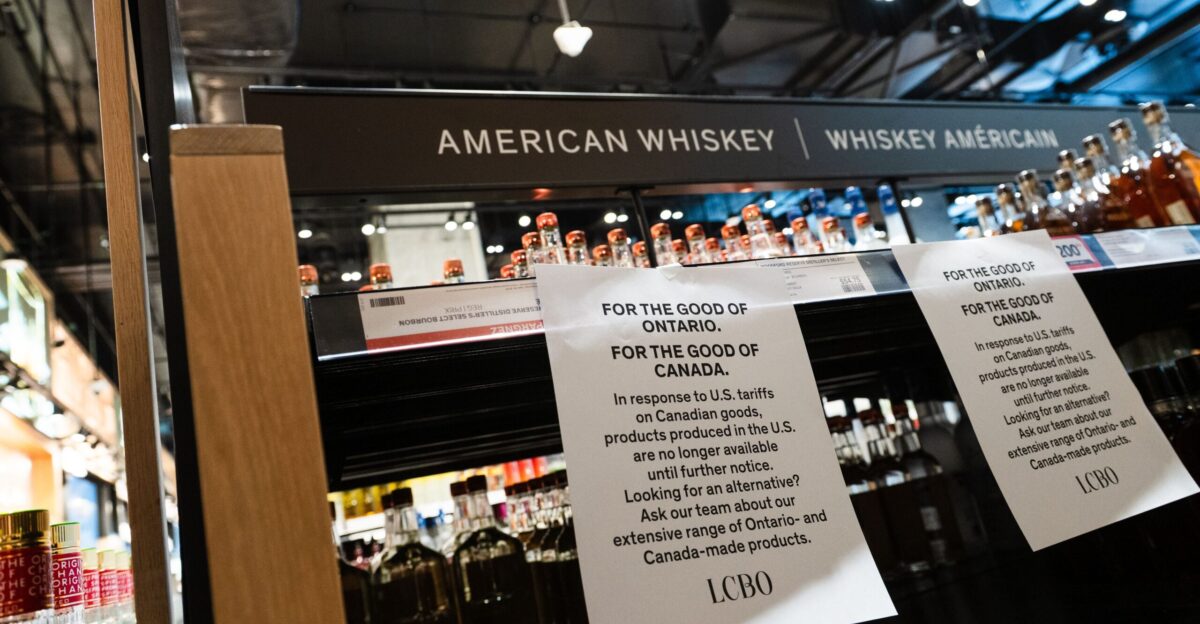
The absence of Jack Daniel’s from Canadian shelves quickly translated into lost revenue. Brown-Forman, the company behind the brand, told investors in its quarterly report that international sales were materially affected by the Canadian dispute. Analysts said tens of millions in expected sales evaporated as retailers cleared U.S. whiskey from shelves. Based on a 62% decline in sales, the quarterly loss for Jack Daniel’s in Canada is estimated at approximately $5.6–6.2 million, assuming prior sales of $9–10 million.
One market strategist described the downturn as sudden and significant, noting that consumer habits adapted faster than anyone anticipated. Brown-Forman said it is revising forecasts to account for the disruption, highlighting the fragility of even established export markets.
The scale of lost revenue prompted some analysts to warn that other American whiskey brands could face similar vulnerability in politically sensitive markets.
Why Canada Matters So Much

Canada is more than a routine export market for Jack Daniel’s; it has long been an important export market for U.S. spirits. Spirits Canada describes the country as one of the top destinations for U.S. exports, where bar culture, tourism, and retail visibility have built loyal consumer bases.
Analysts told Bloomberg that Canadian consumers have historically helped maintain Jack Daniel’s presence worldwide. Losing Canada would disrupt more than just sales — it would threaten brand recognition and momentum that extend globally.
Many executives said Canadian loyalty has often acted as a springboard for international visibility, giving Jack Daniel’s a foothold in other markets.
Tariffs Behind Empty Shelves
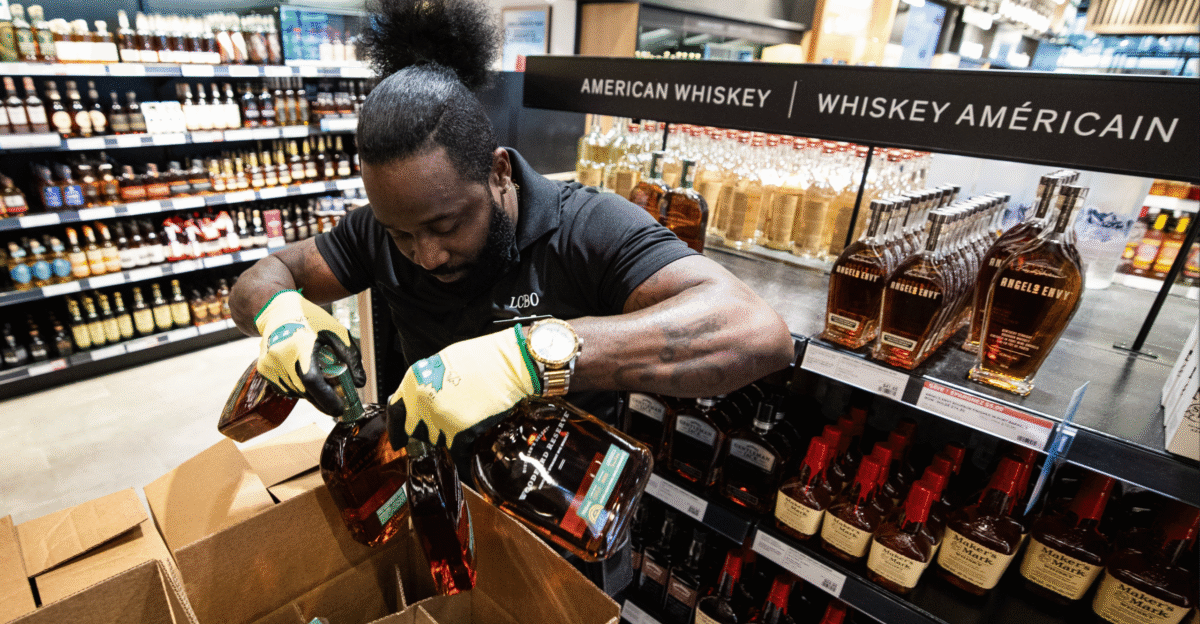
For Canadian drinkers, the change was abrupt. One week, Jack Daniel’s was a familiar presence behind the bar and on store shelves; the next, it disappeared. Provinces enforced a 25% duty on American whiskey; some retailers pulled U.S. brands entirely.
Spirits Canada said the move “left consumers with fewer choices,” while government officials described the tariffs as a countermeasure to U.S. trade policies. The tariffs and resulting retail actions contributed to a dramatic drop in Jack Daniel’s sales across Canada, demonstrating the market’s outsized influence on the brand despite its smaller overall size.
Industry groups warned that shifts in consumer habits are hard to reverse once established, demonstrating how trade policy can quickly reshape the marketplace. Analysts said the withdrawal speed was a warning sign that even established products can be rapidly displaced in volatile trade climates.
Shockwaves Through the Industry

The impact extended rapidly through the retail and hospitality sectors. The Distilled Spirits Council of Canada reported steep declines in American whiskey sales, particularly in Ontario, and distributors scrambled to adjust by expanding contracts with Canadian and European producers.
Marketing campaigns highlighted national pride, encouraging consumers to experiment with local options, and analysts said the rapid pace of change illustrates a stark lesson: that decades of brand loyalty can evaporate almost overnight when politics and tariffs collide with supply chains.
Bars and liquor stores reported immediate shortages of popular cocktails, showing how swiftly supply disruptions ripple through the consumer experience.
Brown-Forman Counts the Cost
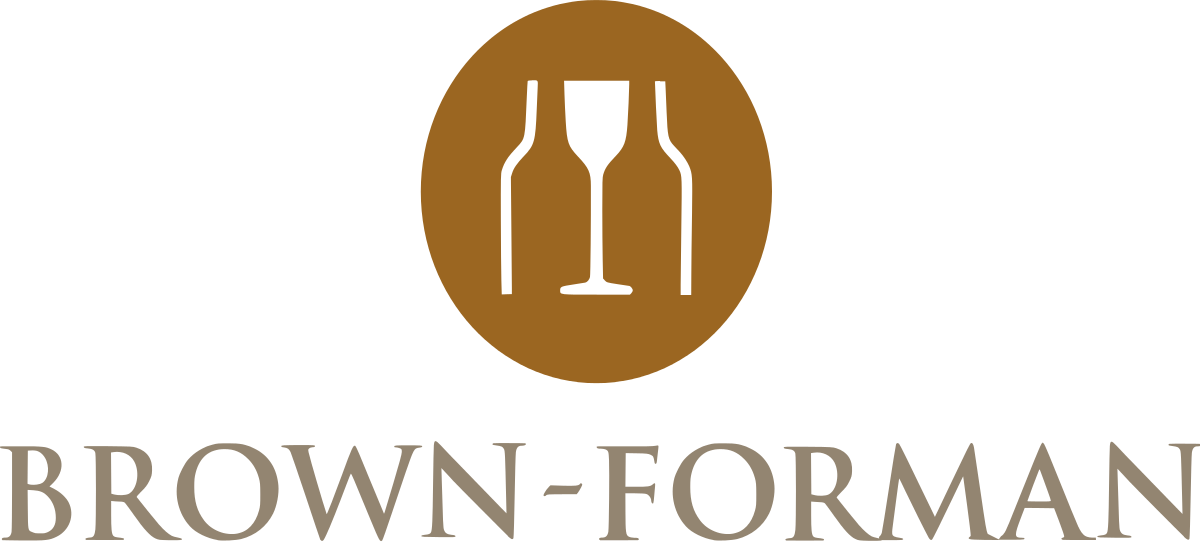
Brown-Forman’s quarterly results reflected the disruption, with executives reporting a year-over-year net income decline and lowered revenue guidance. They described structural changes underway, including operational adjustments and workforce realignment, to offset market volatility.
Analysts said that even relatively small markets like Canada can have outsized effects when sudden and concentrated disruption occurs. Several analysts emphasized that the situation demonstrates how even high-profile brands must maintain flexible operational strategies in the face of international uncertainty.
Hospitality Sector Feels the Pinch

The boycott immediately affected bars, restaurants, and nightclubs. Spirits Canada said that venues faced immediate challenges replacing Jack Daniel’s in popular cocktails and drinks menus. Operators reported lost revenue, added costs, and operational strain, especially in establishments relying heavily on American spirits.
Some venues quickly pivoted to Canadian and European products, while others struggled with supply chain adjustments. Analysts said the situation highlights how intertwined hospitality revenue and consumer choice are.
Beyond numbers, the absence of a familiar staple disrupted customer experiences, showing how macroeconomic policies can ripple down to everyday interactions in local communities.
Canadian Consumers Shift Loyalty
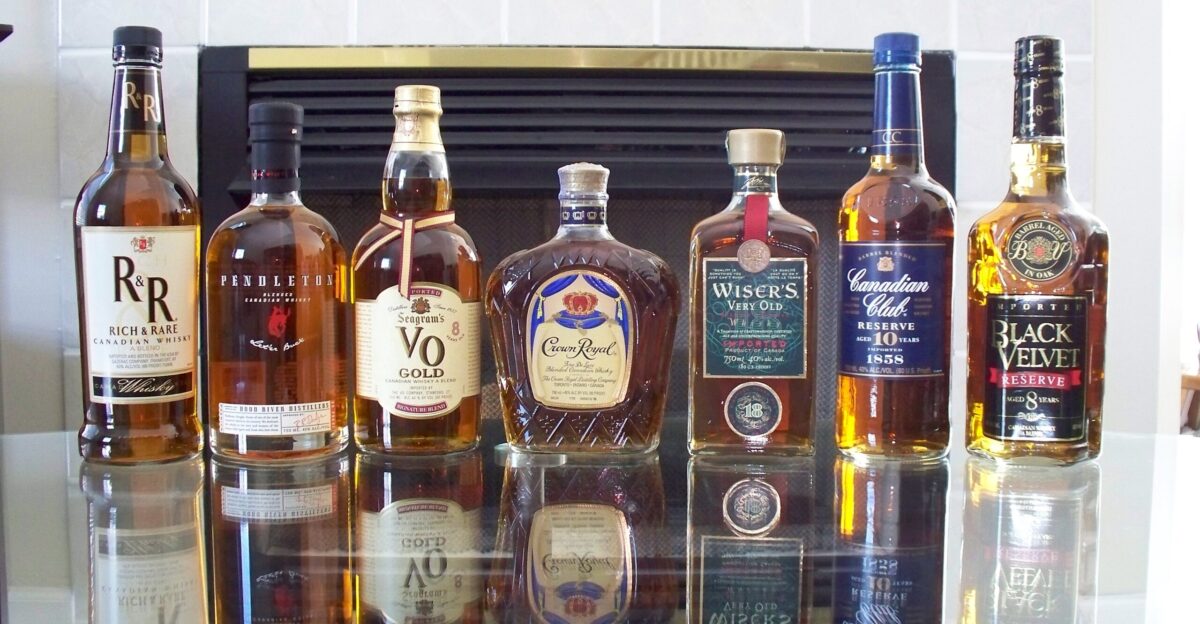
Necessity quickly turned into a preference for many Canadian consumers. Spirits Canada noted a surge in local brand support following the removal of American whiskey. Retailers previously dominated by Jack Daniel’s displays pivoted to Canadian and European options, and analysts told Bloomberg that some consumers acted out of patriotism.
The change reinforced the role of identity in beverage selection, altering liquor store and bar landscapes. Analysts warn that habits formed in 2025 may persist even when U.S. whiskey returns, suggesting the potential for long-term shifts in brand loyalty.
Tariffs Remain a Barrier

Even as some provincial bans eased, the federal 25% import duty on American whiskey remains. Spirits Canada said the tax continues to discourage restocking among retailers and distributors. Analysts told Reuters that lingering tariffs and policy uncertainty will continue suppressing American whiskey sales in Canada, making the market expensive and unpredictable for Brown-Forman.
The continued barrier prompts some executives to reassess expansion strategies, weighing high tariff exposure against other regional growth opportunities.
A Blow to Whiskey Culture

Jack Daniel’s has become a cultural fixture in Canada, from cocktail menus to backyard gatherings. Spirits Canada described its disappearance as a blow to whiskey culture, and bars and restaurants redesigned menus, often highlighting Canadian distilleries instead.
Analysts said the absence represents more than supply disruption; it marks a cultural reset in Canadians’ whiskey consumption. Patrons expressed frustration over losing familiar options, highlighting the brand’s presence in cultural rituals beyond sales figures.
Global Sales Pressure Mounts

Brown-Forman’s challenges extend beyond Canada. Its 2024 global results showed slowing sales, with North America driving much of the decline. Gains in other regions partially offset losses, but executives told investors the Canadian market disruption was disproportionately disruptive given its modest size compared with other major whiskey markets.
Analysts emphasized that even minor market shocks in key regions can echo globally, affecting brand positioning, inventory planning, and export strategies. Several industry observers said the Canadian example is a cautionary tale for other export-dependent brands.
Shifting Tastes and New Rivals

On an earnings call, CEO Lawson Whiting highlighted additional challenges, like cannabis legalization, increased popularity of weight-loss medications, and evolving preferences among younger consumers. “Competition for consumer attention is stronger than ever,” he said.
Analysts said wellness-focused lifestyles are reshaping alcohol consumption, and Jack Daniel’s faces more competitors than ever before, including low-alcohol spirits, craft distilleries, and alternative beverages. Experts say the combination of market disruption and changing tastes intensifies the pressure on legacy brands to innovate rapidly.
Branding Challenges for Legacy Labels

Steeped in history, Jack Daniel’s now faces younger consumers seeking innovation. Analysts said social media amplifies trends in craft whiskey, wellness products, and low-calorie options, making it harder for traditional labels to maintain dominance.
The Canadian disruption showed that even iconic brands must evolve to remain relevant, balancing heritage with modern appeal to attract a new generation of drinkers. Executives acknowledged that legacy branding alone no longer guarantees market resilience.
Cost-Cutting and Strategic Shifts

Executives said that Brown-Forman has responded with operational adjustments, including workforce optimization and facility consolidation, intended to reduce costs and protect cash flow. Analysts told Bloomberg these measures reflect an industry-wide need for leaner operations amid shifting demand and volatile trade conditions.
For Jack Daniel’s, structural changes signal a willingness to adapt while maintaining long-term brand stability, even as cultural and economic headwinds converge.
Investors Show Caution

Canada’s market disruption sent shockwaves through investors. Brown-Forman shares fluctuated sharply, reflecting uncertainty over the company’s global exposure. Analysts told Bloomberg that even relatively small markets can trigger significant investor concern when sudden disruptions hit, particularly for high-profile brands.
Portfolio managers said they are closely tracking ongoing trade negotiations and tariff developments. The episode highlights the fragility of international operations and how political and economic volatility can quickly ripple through investor confidence, turning what might seem like a regional issue into a broader market concern.
Global Reverberations

The Canadian boycott has drawn attention in other key markets. Spirits Canada reported declines in American whiskey sales across Europe, including the U.K. and Germany. Analysts told Bloomberg that different countries may emulate Canada’s approach, potentially affecting future trade flows.
Executives said the episode highlights how quickly market sentiment can shift and the importance of proactive export strategies.
Hospitality Industry Grapples With Change

When Jack Daniel’s disappeared, restaurants and bars faced practical challenges. Industry groups said venues had to renegotiate supplier contracts, reprint menus, and retrain staff for new cocktail offerings.
Analysts said these operational pressures compound the economic impact, demonstrating how trade disruptions extend beyond shelf availability. Some operators embraced the opportunity to feature Canadian distilleries, while others faced customer complaints over missing familiar options.
Brown-Forman Looks Ahead

Despite the turbulence, Brown-Forman remains cautiously optimistic. In earnings guidance, the company projected 2% to 4% growth for 2025. However, CEO Lawson Whiting emphasized that headwinds remain significant and rebuilding trust and market share in Canada would require innovation and reinvention.
Executives said they are pursuing new marketing initiatives and product development aimed at younger consumers while reassuring longtime fans of the brand’s heritage.
Canadian Drinkers Adjust
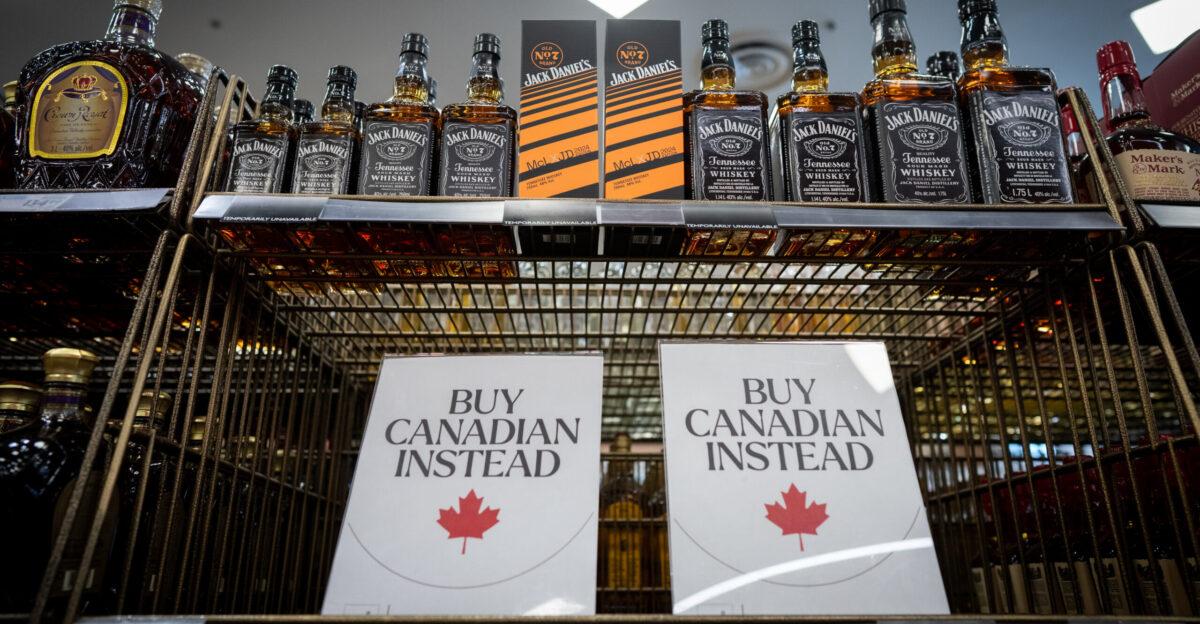
Even with some bans lifted, high tariffs keep U.S. whiskey expensive. Spirits Canada said demand has yet to return to pre-boycott levels, with many Canadians sticking to domestic and alternative brands.
Analysts said consumer habits may be permanently reshaped, meaning brand restoration requires both availability and renewed marketing and engagement. The disruption has forced Canadian drinkers to explore new options, signaling that brand loyalty may need to be earned anew.
Lessons From a Market Shock
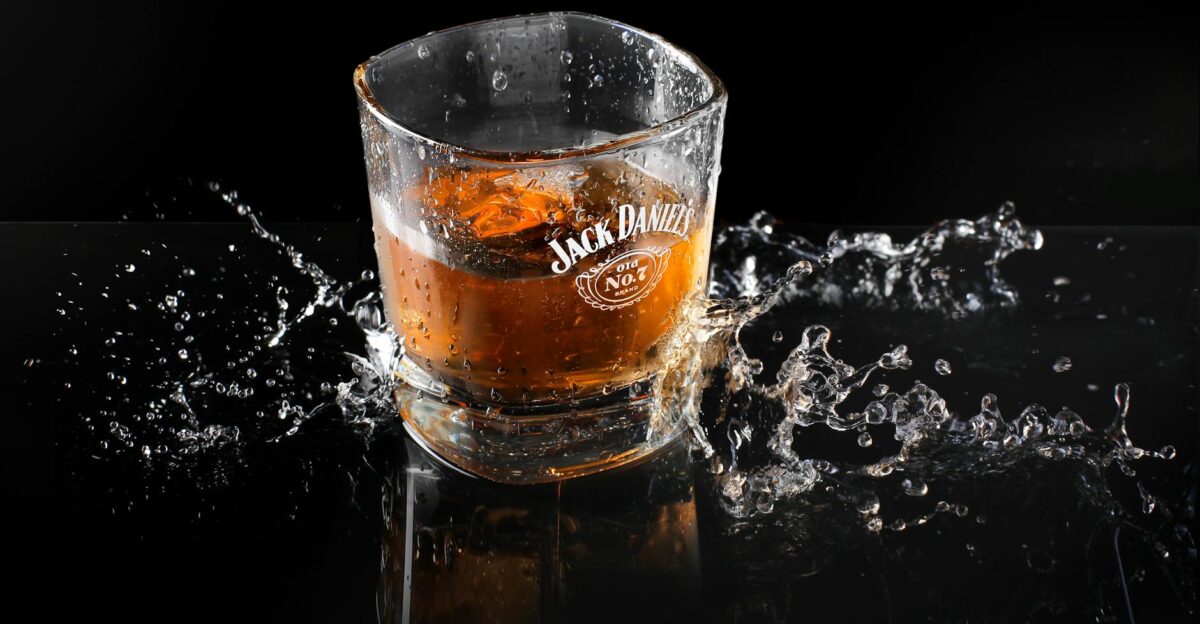
The Canadian disruption has emerged as a stark warning for global brands. Spirits Canada said the episode highlights the need for agility and adaptation across the spirits sector. Analysts told Reuters that relying on history alone is no longer sufficient, as flexibility, innovation, and market awareness are now as critical as product quality and heritage for any global brand.
For Jack Daniel’s, the lesson is unmistakable—iconic status offers no immunity. To thrive, even the world’s most recognizable whiskey must continuously evolve, navigating political, cultural, and economic shifts with foresight and strategic agility.